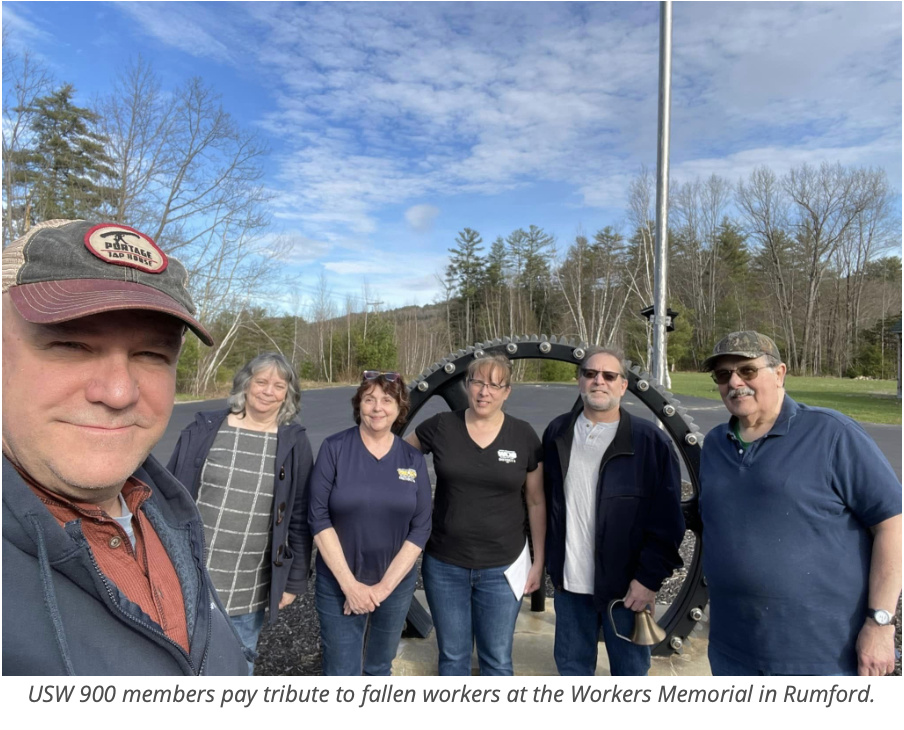Union Members Pay Tribute to 23 Maine Workers Who Died in 2023 at Workers’ Memorial Day/May Day Dinner

PHOTO: Banquet attendees hold signs with names of Maine workers who died due to workplace injuries & illnesses on April.
Union members and allies commemorated the Mainers who died from workplace injuries and illnesses over the past year at the Western Maine Labor Council’s 18th Annual Workers’ Memorial Day/International Workers Day (May Day) dinner and awards ceremony last Sunday in Rumford. Workers' Memorial Day ceremonies were also held by USW 900 members at the memorial marker at their union hall in Rumford and by USW 449 at the brand new Workers' Memorial across from Huhtamaki in Waterville.
Workers' Memorial Day, observed worldwide on April 28, is a day of remembrance and action for workers who were killed, disabled, injured, or sickened in the course of their work. May Day, or International Workers Day, is set aside to commemorate the struggles and victories of all workers worldwide.
The following awards were presented at the Western Maine Labor Council event:
- The Bruce D. Roy Award, recognizing Allan Shepard, Treasurer, and former President, Organizer, and Training Director of IBEW 567, for his exceptional contributions to the labor movement.
- The Workers’ Solidarity Award, honoring the Western Maine Transportation City Bus Drivers Lewiston Auburn ATU 714, for their unwavering dedication to solidarity and collective action.
- The Frances Perkins Award, celebrating Brian Bryant, International President of IAMAW and a native of Livermore, for his lifelong commitment to advancing workers' rights through his leadership within IAMAW.
According to the Maine Department of Labor, at least 23 Mainers died either traveling to or from their job, or as a result of an injury or illness connected to their work in 2023, a rate of 3.8 per 100,000 workers. This is slightly above the national rate of 3.7. The 2024 edition of the AFL-CIO’s “Death on the Job: The Toll of Neglect” report found that 23 Mainers also died on the job in 2022, the highest number since 2011. This includes at least three people who were working when they were killed in a mass shooting in Lewiston last October.
The most recent numbers from the U.S. Bureau of Labor Statistics show our state had the nation's highest rate of recorded non-fatal injuries and illnesses at private workplaces in the nation in 2022. There were a total of 19,900 workplaces injuries and illnesses in private industry in Maine in 2022, a rate of 5 percent.

There are eight OSHA workplace safety and health inspectors in Maine, which means it would take 157 years to inspect every workplace in the state, according to the report. NewsCenter Maine did a good story on this disturbing trend and interviewed IBEW 567 member Kilton Webb, Vice President of the Western Maine Labor Council.
Maine Director of Labor Standards Pushes for Better Health & Safety Enforcement
This year, the Workers’ Memorial Day keynote speaker was Dr. Jason Moyer-Lee, Director of the Bureau of Labor Standards at the Maine Department of Labor. Lee described the history of unions organizing for safer working conditions, from UAW workers leading strikes for better air quality and workplace temperatures in the 1950s and United Mine Workers’ strikes that led to compensation for victims of black lung disease in West Virginia and in federal law a decade later, to unions pushing for what became the federal Occupational Safety & Health Administration (OSHA) in 1971.
Workers’ Memorial Day is celebrated on April 28 to commemorate the founding of the OSHA. The rate of workplace fatalities has declined dramatically from a high of 18 per 100,000 workers in 1970 to 3.7 per 100,000 workers in 2022, thanks in large part to the creation of OSHA.

Moyer-Lee pointed to a 2021 study by the World Health Organization and the International Labor Organization which identified the leading cause of death for workers was working excessively long hours.
“So when our wage and hour division enforces Maine’s cap on mandatory overtime, and when we enforce workers’ rights to additional pay for overtime hours, we are protecting worker safety and health,” he said.
He added that poverty is also a threat to health because very low-paid workers are more susceptible to employer abuse, are less likely to speak out and may feel more pressure to work faster and less safely.
“So, when we enforce minimum wage, our anti-retaliation statute, and a worker’s right to full and timely payment of their wages, we are also protecting worker safety and health,” he said.
Paid time off, he noted is also a workplace health and safety issue to ensure workers have time to rest and recuperate from overwork, illness and stress. He argued that enforcing sexual harassment statutes are critical for workplace safety and mental well being. Enforcing domestic violence leave laws ensure victims can get time off of work to receive domestic violence services and go to court, he added.

Labor Laws Are Only as Good as Enforcement
However, Moyer Lee pointed out that labor laws are only as good as the effectiveness in enforcing them. He said while the Bureau of Labor Standards does substantial public outreach and education on wage and hour and health and safety laws, enforcement of the law needs to be strengthened. Over the last several years, the BLS has collected less than $3 in fines on average per violation. Moyer-Lee said the Bureau’s resources are so limited that Maine employers can expect an investigation once every 323 years.
Recently, Governor Mills signed a bill with new rules proposed by the Bureau to change the structure for employers who break labor laws. Instead of starting with the minimum fine allowed – often $50 or $100 - and then usually reducing from there, under the new rule the fine starts at $1,000 per violation and then it would be reduced only if clear criteria are met. The new rule also requires the Bureau to investigate where labor law violations are happening and dedicate resources to proactive investigations. Workers in non-union workplaces are often afraid to file a complaint for fear of retaliation, so allowing for these investigations in workplaces where employees have not filed complaints will ensure more employers follow labor laws.
Moyer-Lee said that one of the major problems with enforcement is that the Bureau did not have the power to order employers to pay workers the wages they were owed, or liquidated damages without filing proceedings through the Attorney General’s office. That’s why the Bureau submitted LD 372, which will give the Bureau the power to order employers to pay workers back wages, liquidated damages, and interest for the first time.
“When we are effective, it will make it easier for you to be effective. And vice-versa. Although our roles are in many ways different, protecting workers’ lives and livelihoods is a common denominator,” Moyer Lee concluded. “That’s important to say today of all days. Because on International Workers’ Memorial Day we not only remember the dead. But we renew our commitment to fight like hell for the living.”
